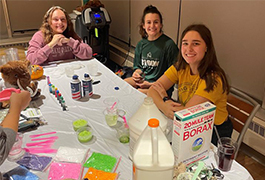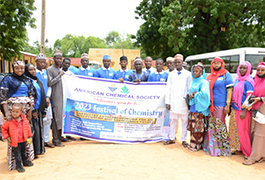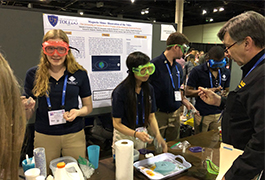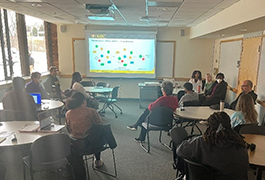Emory University Hosts Events that Serve and Excite the Community
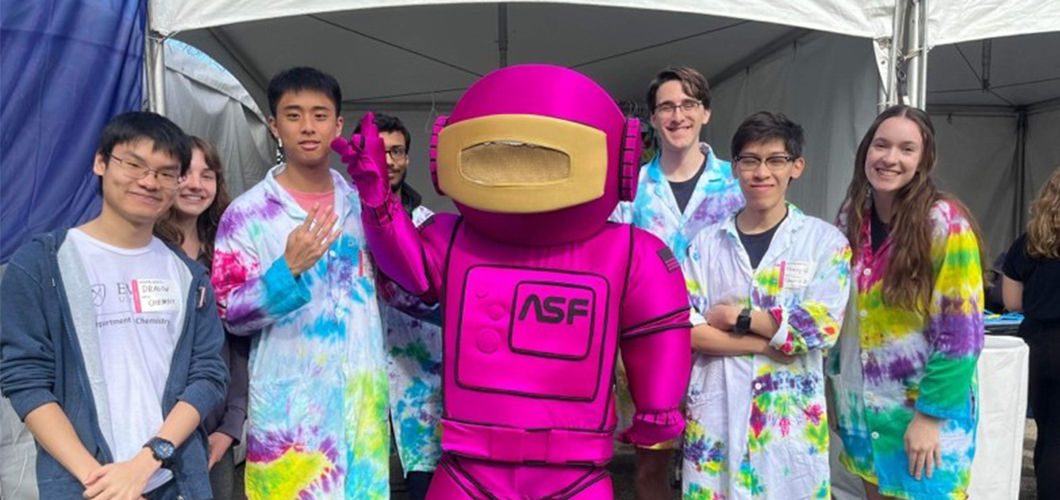
Location: Atlanta, GA
Faculty Advisor: Douglas Mulford
Current Co-presidents: Valentina Esho and Emma Funderburg
Chapter Members: 47
Instagram page
Over the past year, Emory University’s ACS Student Chapter, ChEmory, have made waves in the community, bringing exciting chemistry to life on campus and in the greater Atlanta community that drew hundreds or participants. We spoke with chapter president, Amy Wang, and co-president, Valentina Esho, who shared what they accomplished, steps they took to be successful, and how they made sure planning and execution ran smoothly.
If your chapter is looking for pointers on organizing community events, grab a notebook!
You hosted several events in your community in 2022 and 2023. What did you showcase and why were these events important to your chapter?
Last fall, we organized our annual demo show to celebrate National Chemistry Week and allow audiences to share in our passion for chemistry. We recruited 20 undergraduate student volunteers from within and outside of our chapter by promoting the event at our general chapter meetings and posting flyers in classrooms. The volunteers performed several demos for Emory undergraduates and faculty alike, including our famous liquid nitrogen cloud (a mini explosion depicting what occurs in grain elevators), a barfing pumpkin, slime gummy worms, and other activities.
At the end of the demo show, we provided the audience with cupcakes from our homemade periodic table of cupcakes. This is our largest event in the fall semester with around 100 audience members.
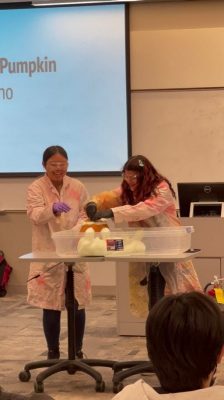
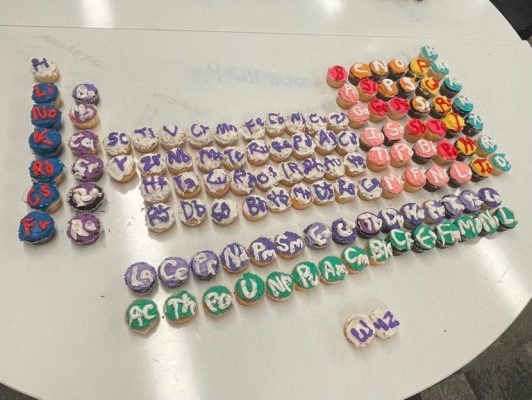
During the Spring 2023 semester, we hosted an even larger demo show on our campus with demos similar to our previous shows. The show was open to the public. This event was affiliated with the Atlanta Science Festival, so many families came to the show and their children were able to learn about science by observing the demos. We wanted both parents and children to enjoy the show while fostering the children’s appreciation for chemistry and science at a young age.
This demo show was special for our chapter because we had over 200 RSVPs from people of all backgrounds. We made sure we had enough space and supplies so that we could reach and teach as many people as possible.
The day after the large demo show, we hosted a booth at a separate event in Piedmont Park hosted by the Atlanta Science Festival. We taught attendees how to make slime and let them take home their creation in Ziploc bags. Activity descriptions were also printed onto the table so that attendees could follow along or take a photo to recreate their slime at a later time. Many children wanted to learn how to make slime. Our booth’s activity was very hands-on, which helped the children engage in science and their sense of creativity.
Another activity we did was examining the properties of cornstarch and water mixed in a small kiddie pool. We provided the children with buckets filled with water to ensure they can clean up afterwards. For these activities, gloves were not needed for safety, according to our personal research and recommendations from our advisor.
Moving forward, we may provide gloves in case of any allergies. We did not keep track of the exact number of visitors and participants, but there were dozens. We were very happy to share our scientific curiosity and excitement with others.
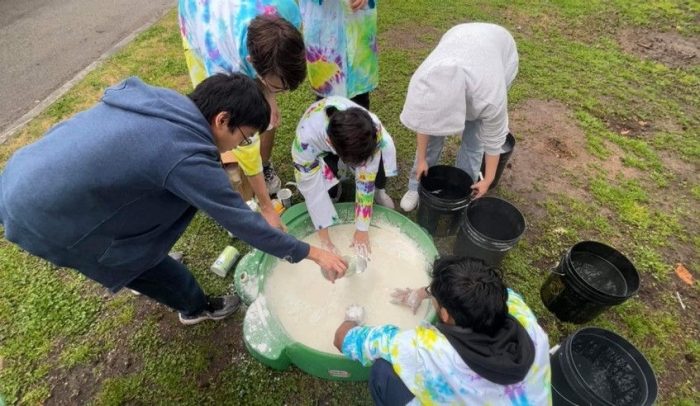
How did you coordinate the events? Did you run into any challenges?
For all three events, the most important part of planning was recruiting volunteers for the demonstrations. We organized volunteer training sessions for the demos to ensure that everyone was well-prepared. It can be challenging to figure out how to schedule these sessions, as everyone is also balancing their individual busy schedules. But because our advisor, Dr. Douglas Mulford, is flexible in making time for training sessions, we have been able to get most volunteers onboard and trained efficiently.
To be inclusive of different learning styles, students receive written and verbal instructions at the training sessions. Dr. Mulford made the trainings hands-on and visual. We try to complete trainings at least a few days before events to ensure we have enough time to address any needed changes or to provide additional trainings.
Although we have yet to run into any significant challenges, it can be overwhelming at times to oversee so many moving parts, like demo training, event logistics, room bookings, purchasing demo materials, etc. However, by delegating responsibilities to various members of the executive board, most of our events have run smoothly and successfully.
How did you advertise the events?
To advertise these events, we encouraged chemistry professors to spread the word, and members put up flyers and posted on social media so that we could engage as many people as possible. Over time, attendance has steadily increased and we have expanded the number of demos that we do.
We recently started collaborating with other clubs, such as Emory’s Citizen Science HD (CSHD) club, to increase engagement. CSHD has a similar mission of promoting science to the local community. They helped us spread the word about our events and brought boba tea as a fun drink.
What new skills or approaches to organizing did your chapter learn from doing community work? If you could do anything differently, what would it be?
Since we had a new faculty advisor join the chapter this year, one of the important things we learned was how to effectively communicate between two faculty advisors while keeping both in the loop. For example, making sure to copy both faculty advisors on emails and have joint meetings ensured that everything was communicated and no one was missing any information.
Learning to effectively delegate responsibilities to advisors and executive members was also an important skill that allowed us to complete tasks on time. In addition, through our various demo shows, we improved our ability to coordinate with volunteers to ensure that everyone was educated on demo procedures and safety, in addition to helping provide them with an understanding of the background science so that they could explain to those in attendance.
What advice would you give ACS student chapters that have never organized a community service function?
Choose your events carefully! While many ideas are great, not all of them will be great for the members of the chapter. You also want to get the highest turnout possible. It doesn’t have to be original, but if you’re looking for something new, choose a demo that is fun, easy to do, and one that students would want to attend as participants. There are many demos that can be found on the ACS website that are cheap to run, safe to show, and easy to learn and explain. A fun event will create a memorable community service function for volunteers and the community.

